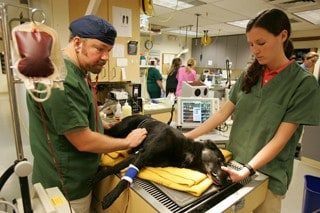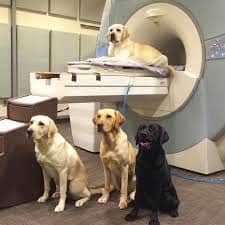Veterinary medicine lags behind human medicine by 15-20 years in terms of treatments, diagnostic tools, medications and specialists.
Some pet owners aren’t aware that there are veterinary internists, cardiologists, radiologists, neurologists, surgeons, oncologists, behaviorists, criticalists and more.
A good general practitioner is similar to a human GP (general practitioner) but to a certain extent, has to be a jack-of-all trades, too. For instance, many veterinarians treat infectious disease, dermatological disease, cardiac disease, endocrine disease, etc. as well as perform routine surgery. Some GP veterinarians even mix in emergency medicine.
However, as veterinary medicine more closely follows human medicine and is starting to specialize, the role of the GP is changing a bit. 30 years ago, almost all GPs did their own advanced surgical procedures including orthopedic procedures. Today, as the prevalence of boarded, residency-trained veterinary surgeons emerges, the standard of care and outcome of advanced surgical procedures changes with it.
In today’s veterinary climate, whether it be the fields of oncology, cardiology, surgery and more, your family veterinarian may offer you the option of referral to a specialist. He or she may do this if the problem is serious, recurring or difficult to diagnose and requires special equipment such as CT, MRI, endoscopy and so on.
The specialist should have access to appropriate equipment and have knowledge in one particular area so that whatever is being treated can have extra focus.
Whether your family veterinarian offers you a referral to a specialist may depend on their own comfort with a particular area as well as their time and ability to devote to diagnosing and managing things out-of-the ordinary.
In some cases, your pet may simply require one or more days of continuous care, which cannot be achieved well in a day practice. In these instances a 24/7 emergency facility offers your pet round the clock care by veterinarians and nursing staff (called technicians). Most major cities offer 24/7 emergency veterinary care. Some are associated with specialty services and others are solely for emergencies.
Patients that are oxygen dependent, need control of bleeding or blood pressure, blood sugar, continuous intravenous fluids and much more need and benefit from 24/7 care. It is no longer always acceptable to leave an unattended animal in a cage with intravenous fluids running for 14 hours overnight.
It’s a different world today for veterinary care and advancements and what was considered acceptable a decade ago is falling out of favor as our desire to prioritize our pets grows.
Urban Animal Veterinary Hospital tries to offer our pet owners the best of both worlds – we’re great at wellness and preventative care AND we’re also very good at stabilizing emergency cases and consulting with specialists for things like cardiology, internal medicine, oncology, dermatology, routine surgery and more. That said, we recognize our limits and for cases that need overnight hospitalization, specialized surgery and more advanced diagnostics such as MRI or CT or advanced treatments like radiation and chemotherapy, we refer.
If your cat or dog animal companion requires anything from the routine to a something a little more, we’re a great place to visit and can give you a good idea where the direction of care needs to go. Call us to schedule an appointment today!




